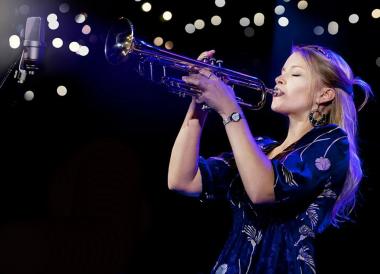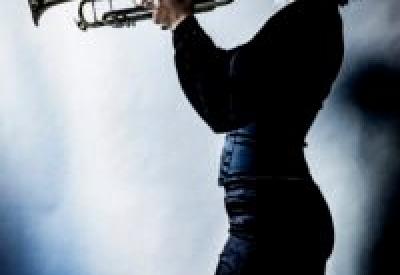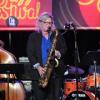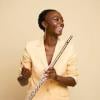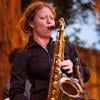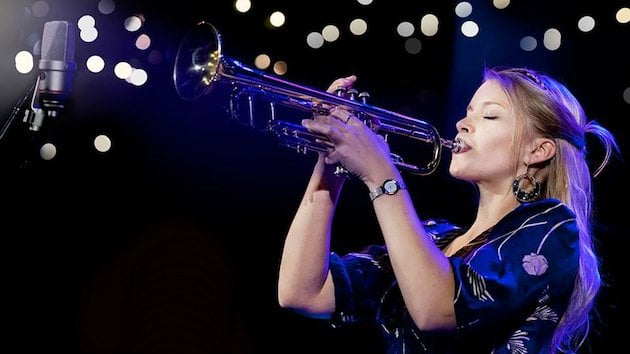
“Breath is everything,” says trumpeter Bria Skonberg in a phone interview. She comes by this wisdom by way of having recently given birth to her first child in October, and through her highly regarded work as a bold, bluesy jazz composer, vocalist, and player of a brass instrument. Speaking about “Villain Vanguard,” a track on her newest album, Nothing Never Happens, she says moving in solidarity with like-minded people in a women’s march a few years ago then and experiencing the birthing process caused her to know that she is an ultimate creator — simultaneously incredibly strong and equally vulnerable. “Women are everything,” she says.
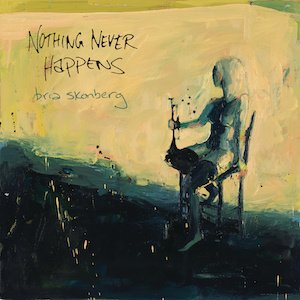 Skonberg appears with her quintet in a virtual premiere Jan. 7 (available on demand until April 7) as part of Cal Performances at Home. The program, recorded at the historic Louis Armstrong House in Queens, New York, streams for three months and includes selections from her new album, jazz classics, original compositions, and pop song by the Beatles, Queen, and more.
Skonberg appears with her quintet in a virtual premiere Jan. 7 (available on demand until April 7) as part of Cal Performances at Home. The program, recorded at the historic Louis Armstrong House in Queens, New York, streams for three months and includes selections from her new album, jazz classics, original compositions, and pop song by the Beatles, Queen, and more.
Skonberg grew up in rural Canada in a household filled with music that included traditional Irish and other folk tunes, her parents’ ’50s and ’60s rock and pop songs, the hip-hop of the 1990s, and of course, jazz.
In her role as an educator, Skonberg concentrates on students finding and fully activating the voices of their instruments and/or vocal bodies. Raising the visibility of women in music history has been and remains, in the new year, among her primary goals. For herself as an artist and bandleader, she says more collaborative projects and getting uncomfortable will lead to the growth she seeks and encourages in others.
Is this your first child? How’s it going?
Yes. It’s my first time ... so I can say it’s the best it’s ever been! It’s an immense learning journey. I feel fortunate to have this time, despite having to stay at home, to just focus solely on that. Much like jazz, it requires a lot of improvising.
Your son arrived on Oct. 15. Your New York Hot Jazz Camp Virtual Weekend Workshop launched Oct. 9–11. Did you do the camp and all of those sessions?
Yes, I did. The virtual camp was Friday to Sunday and on Thursday he was born. He came to the gig two-and-a-half weeks early. He showed up early, just like a pro. My due date was actually Nov. 1. I had just packed the hospital bag.
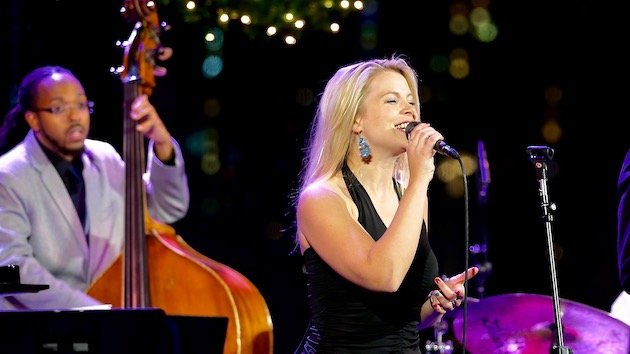
Your COVID-19 experiences and the birth of your son: Are you tracking the time? Are you journaling?
Despite it being very different, it’s one of the more consistent times in my life because I’ve been in the same place. Usually, I have so much variety, touring all over the place. With my practice routine, I’ve honed in on the technical aspects of trumpet playing. I can get into the minutia: breath support, articulation, getting better over time by using a metronome and playing a passage a little faster every day. I track my progress: the dexterity of my fingers, the tongue, all the musculature. I came up with a routine and methods for getting better. I ended up doing more teaching, which meant I was able to share that method with students, so that’s really progressed.
Also, I launched into doing livestreams on Facebook. Before COVID I had some of the biggest highlights of my career, even playing at Carnegie Hall on Valentine’s Day and then, a month later, I was internet busking with a ukulele. It was a humbling experience. I needed to still connect with people. I ended up getting this great rapport with a large following on Facebook; just jamming songs, not the supremely polished concerts I like to put out. I did live chats and it was special to me. Those have been my journals: twice weekly livestreams for six months, until my son was born.
The discomforts of the pandemic for you and other performing artists: loneliness, not traveling, etc. Do they find their way into your work as a composer? Do the limitations impact you as a performer?
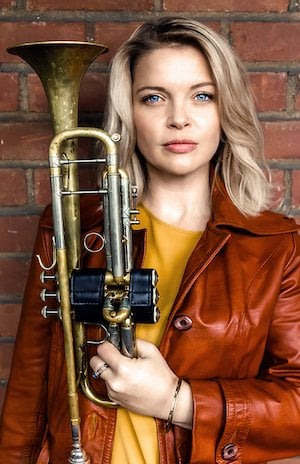
Being a performer and playing a trumpet and singing are big releases. It’s a way to expel energy I have. I think I did a good job of pivoting quickly into the virtual world. I’m generally optimistic: What can I do, what can’t I do? I launched into doing a lot of little things and not thinking about the death and the darkness. Then six weeks into it, I edited a video of my band playing “Blackout” [a song on the new CD], and I just started crying. I remembered being in a band, standing in front of that rhythm section, feeling the vibrations of the wall of sound and being able to play and sing on top of it. That’s something I had to get used to over the last 10 months. Not being able to expel that energy.
Not being able to visit my family in Canada and see them, especially while pregnant and having a child, that’s been difficult. My spirit is nebulous. Especially as the end line to COVID keeps getting further and further away.
Musically, the livestreams taught me people want to connect. When I return to performing live, I’ll expect it to be more singalong interactive, more giving, more ways to connect. Compositionally I’ve had a few breakthroughs. My creative juices have been about survival, maintenance instinct. Instead of me being introspective, I’ve spent less time diving into myself and more time reaching out to other people. There’s more collaborating with people I’d never have otherwise had a chance to collaborate with.
My creative process has been to sit at a keyboard and create silences and wait for ideas to come out. The ideas coming out have been simple, healing, in major keys. Grace is coming to mind. We have to afford ourselves grace and maybe not dive too deep. Maintain a general sense of trying to keep going.
I’ve been playing along with recordings of other artists, just because I miss playing with a band. Playing music is social for me. I like playing with people; I like playing for people. I’ll put on Louis Armstrong or [trumpeter] Lee Morgan or not even jazz and play with them. It’s also been a time for us to look at ourselves. I recognize the privilege I have being a white female. Right now it’s about doing more listening. Maybe I don’t need to put my stamp on things. I’m doing more listening to the outside world now.
Tell us a little about instrumentation and mood in your music.
I try to first identify which mood I want a song to go through. Sometimes there are many moods. “So Is the Day” has been one of my tour songs for long time and at the beginning, it’s very sparse like a dark monologue: a bass with a bow, drums with a mallet, and a voice. As the mood progresses, grows, rises, it gets a little annoyed, and I use a high-hat of a drum set with a “poke-at-you” sound. Another chorus, the mood is like something in the back of your mind that is bothering you; I enter the clarinet and it plays long lines. The instruments add character to the piece. For the last album, I wanted it more soulful, bluesy; definitely [turned to] guitar and Hammond organ to get a more-gritty sound, a sassy, saucy feel.
What did you learn about breath, after being pregnant and having given birth? Do you think you’ll be more effective or efficient as a brass player?
I’m doing more of a study on that with a good friend who’s a physical trainer. Breath is everything. The way we breath, through the nose versus the mouth; how does that effect your diaphragm, your core strength? I’ve always been aware of that, but now, stretching it out, rehabilitating those muscles, is interesting. It is making me more efficient and more aware, to be doing exercises to strengthen it. With COVID, you’re either inside or outside with a mask. I will not take it for granted to take a big gulp of delicious air after this is over. Everything now is contained: Our breath is closer, screens are closer, our worlds are smaller. I hope next summer I’m playing outdoor festivals in big areas.
Let’s talk about a few tracks on your new album. What would you like known about “Blackout”?
Doug Wamble, the guitarist, is phenomenal. He’s versatile and plays just the right thing—not too much. Blackout and the album itself came out of feeling the white noise of media, news, and things being hammered down our throats for the last couple of years. The song is about going off the grid, shutting everything out and being creative. The instrumentation I wanted is extra bluesy, so we used the Hammond organ and put a cloth over part of the drums to give it a muted sound. We played with the vibe and the groove I think is like “I Heard It Through the Grapevine.” [She vocalizes it.] Resilience was an inspiration behind that song.
And “Square One”?
That song has been in my pocket for a couple of years. During a Nashville writing trip I came up with the framework. It’s about when you go through life and think you accomplish something you set out to achieve, but you realize you’re just at the bottom of another journey when you get there. It’s a sensitive moment and the song means a lot to me. For live performance and the [taped] one for Cal Performances I started playing string piano as an encore. I would have been too shy to do that before COVID. I’m challenging myself with new skills.
Now “Bang Bang”:
I’ve always loved the song. I can’t remember the specific moment I first heard it but it’s just kind of haunting. I was thinking about gun culture here in the States. It’s a love song, but dramatic and topical. Gun violence, especially in schools. As I perform it, I’ll think about the emotions I feel and put that into the music.
What song would you select to speak about?
“Villain Vanguard” was inspired by one of the women’s marches. It’s built around what it’s like to be in a protest. Participating in one, back in 2016, it ties into my creative process. Two years ago, I just felt overwhelmed with the noise of the climate. I started to play music as a way of processing the emotions. “Villain Vanguard” is one of the first songs that just came out: It’s driving, frustrated, but hopeful at the same time. Each element is a voice in the crowd. It’s instructive. Being in the march, it was invigorating, and affirming to be with people who agree that women should make choices for their bodies. Women are strong. If I didn’t know that before, after giving birth, it’s like we’re the most vulnerable and so incredibly strong at the same time. Women are everything.
How do you bring the legacies of women in the music business into your concerts ?
Women have always been a part of music history; they just didn’t get written into the books. Accessing the stories of these incredible pioneers in music, I highlight an artist in my set. I don’t make it “this woman is the first woman to ...” I make it, “this song was written by Valaida Snow, who was an African-American trumpet player in the 1930s.” That’s a fact. I don’t need to go into the ups and downs, I can just cue the next thing and move on. Visibility: They’re there, people just need to be able to see them.
Right now, because of the way I was encouraged by my teachers and parents, I never thought I was at a disadvantage because I was a girl playing an instrument. I just went for it. Now in my 30s and seeing other musicians who have been more proactive with it, I’m searching out opportunities to connect one-on-one with girl trumpet players. I’m providing mentorship and focusing more on those players.
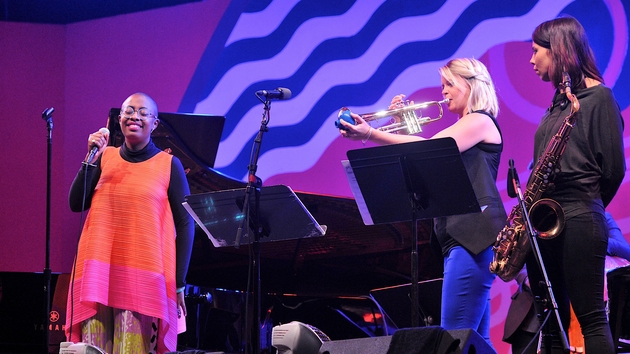
Which vocalists are you listening to now — jazz singers or other genre performers?
I just recorded a song with a vocalist from Argentina, Sophia Ray. We put out a Spanish version of “Little Drummer Boy.” I like Latin American artists, Cuban music, rich voices.
I was listening to Dolly Parton, more for her songwriting. Let me look at my playlist ... I’ve been listening to Bobby McFerrin. He’s an incredible artist.
What music experiences will you seek after COVID? Will you look for comfort or find new challenges in discomfort?
Definitely discomfort. It’s about collaborating with different artists from different genres. You have to be vulnerable and be confident in yourself. Perhaps writing songs with other people, so it’s a shared experience? That’s a challenge. As a performer, I’m a trained extrovert, but otherwise an introvert, actually. Post-COVID, I’m open to anything, perhaps in the Latin American area. They’re open to trumpet and percussion and voice, so maybe I’ll dabble that way.

